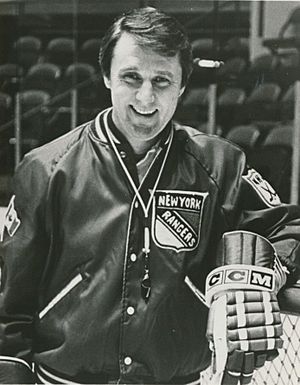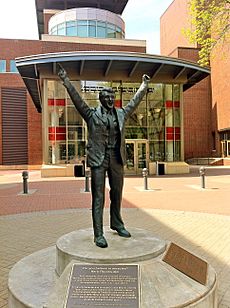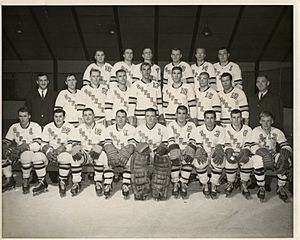Herb Brooks facts for kids
Quick facts for kids Herb Brooks |
|||
|---|---|---|---|
| Hockey Hall of Fame, 2006 (Builder) | |||

Brooks with the New York Rangers in 1983
|
|||
| Born | August 5, 1937 Saint Paul, Minnesota, U.S. |
||
| Died | August 11, 2003 (aged 66) near Forest Lake, Minnesota, U.S. |
||
Herbert Paul Brooks Jr. (born August 5, 1937 – died August 11, 2003) was an American ice hockey player and coach. He is most famous for coaching the U.S. Olympic team to a gold medal in 1980 at Lake Placid. In those Games, Brooks' American team achieved a huge upset against the strong Soviet team. This game became known as the "Miracle on Ice."
Brooks also coached several National Hockey League (NHL) teams. He even coached the French team at the 1998 Winter Olympics. Later, he led the U.S. men's team to a silver medal at the 2002 Winter Olympics in Salt Lake City. Brooks passed away in a car accident in 2003. He was added to the Hockey Hall of Fame in 2006 for his contributions to the sport.
Contents
Early Life and Playing Career
Herb Brooks was born in Saint Paul, Minnesota. He went to Johnson High School, where his team won the state ice hockey championship in 1955.
Brooks continued playing ice hockey for the University of Minnesota Gophers from 1955 to 1959. He was almost part of the 1960 Olympic team. However, he was the very last player cut from the team just a week before the Games began. Three weeks later, he watched from home as the team he almost joined won the gold medal. This moment motivated Brooks even more to succeed.
From 1960 to 1970, Brooks played for the U.S. national team eight times. This included playing in the 1964 and 1968 Olympic Games.
Coaching Achievements
After his playing career, Herb Brooks became a coach. He famously led his old college team, the Minnesota Golden Gophers, to win three NCAA national championships. These wins happened in 1974, 1976, and 1979.
The "Miracle on Ice" Team
Soon after his third college championship, Brooks was chosen to coach the 1980 U.S. Olympic team. He carefully selected his players, choosing some from his Minnesota team and others from rival colleges like Boston University.
To prepare for the strong Soviet Union team, Brooks created a special style of play. It mixed the tough North American style with the faster European style. This new approach focused on creativity and teamwork. He also made sure his players were in top physical shape. He believed that being tired in the final period was why other teams often lost to the Soviets.
Coaching in the NHL and Beyond
After winning the Olympic gold medal, Brooks coached HC Davos in Switzerland for a short time. From 1981 to 1985, he coached the New York Rangers in the National Hockey League. He was the first American-born coach for the Rangers to win 100 games.
Brooks also coached other NHL teams, including the Minnesota North Stars (1987–1988), New Jersey Devils (1992–1993), and Pittsburgh Penguins (1999–2000). He also worked as a scout and director of player development for the Penguins.
Brooks coached two more Olympic hockey teams. He led Team France at the 1998 Winter Olympics in Nagano. Then, he coached the U.S. team again at the 2002 Winter Olympics in Salt Lake City. The 2002 U.S. team beat Russia in the semi-finals, exactly 22 years after the "Miracle on Ice" game. They went on to win a silver medal, losing to Canada in the final.
Brooks was recognized for his great career. He was inducted into the United States Hockey Hall of Fame in 1990 and the International Hockey Hall of Fame in 1999. In 2006, he was added to the Hockey Hall of Fame.
Personal Life
Herb Brooks married Patricia Lane, known as Patti, in 1965. They had two children, Dan and Kelly.
Death and Lasting Impact

On August 11, 2003, just six days after his 66th birthday, Brooks died in a car accident in Minnesota. It is thought that he fell asleep while driving. He was not wearing his seat belt, and police believed he might have survived if he had been.
In 2004, Disney released a movie about the 1980 Olympic team called Miracle. Actor Kurt Russell played Herb Brooks in the film. Brooks himself helped as a consultant for the movie before he passed away. At the end of the movie, there is a dedication to him that says, "He never saw it. He lived it."
Many places and awards honor Herb Brooks. The Olympic ice arena in Lake Placid, New York, where the "Miracle on Ice" happened, was renamed Herb Brooks Arena. A statue of Brooks was put up in Saint Paul, Minnesota, showing his reaction to the famous victory.
The Herb Brooks Award is given to the best high school hockey player in Minnesota. The National Hockey Center at St. Cloud State University was also named after him in 2013.
Brooks' Famous Sayings
Herb Brooks was known for his unique and inspiring phrases, which his players called "Brooksisms." Some of these sayings were even featured in the movie Miracle. Here are a few:
- "You can't be common, the common man goes nowhere. You have to be uncommon."
- "Great moments are born from great opportunity."
- "You know, Willy Wonka said it best: we are the music makers and we are the dreamers of dreams."
- "This team isn't talented enough to win on talent alone."
- "If you lose this game you'll take it to your grave."
- "You were born to be a player. You were meant to be here. This moment is yours."
- "Write your own book instead of reading someone else's book about success."
- "The legs feed the wolf."
Images for kids
 | Bayard Rustin |
 | Jeannette Carter |
 | Jeremiah A. Brown |



